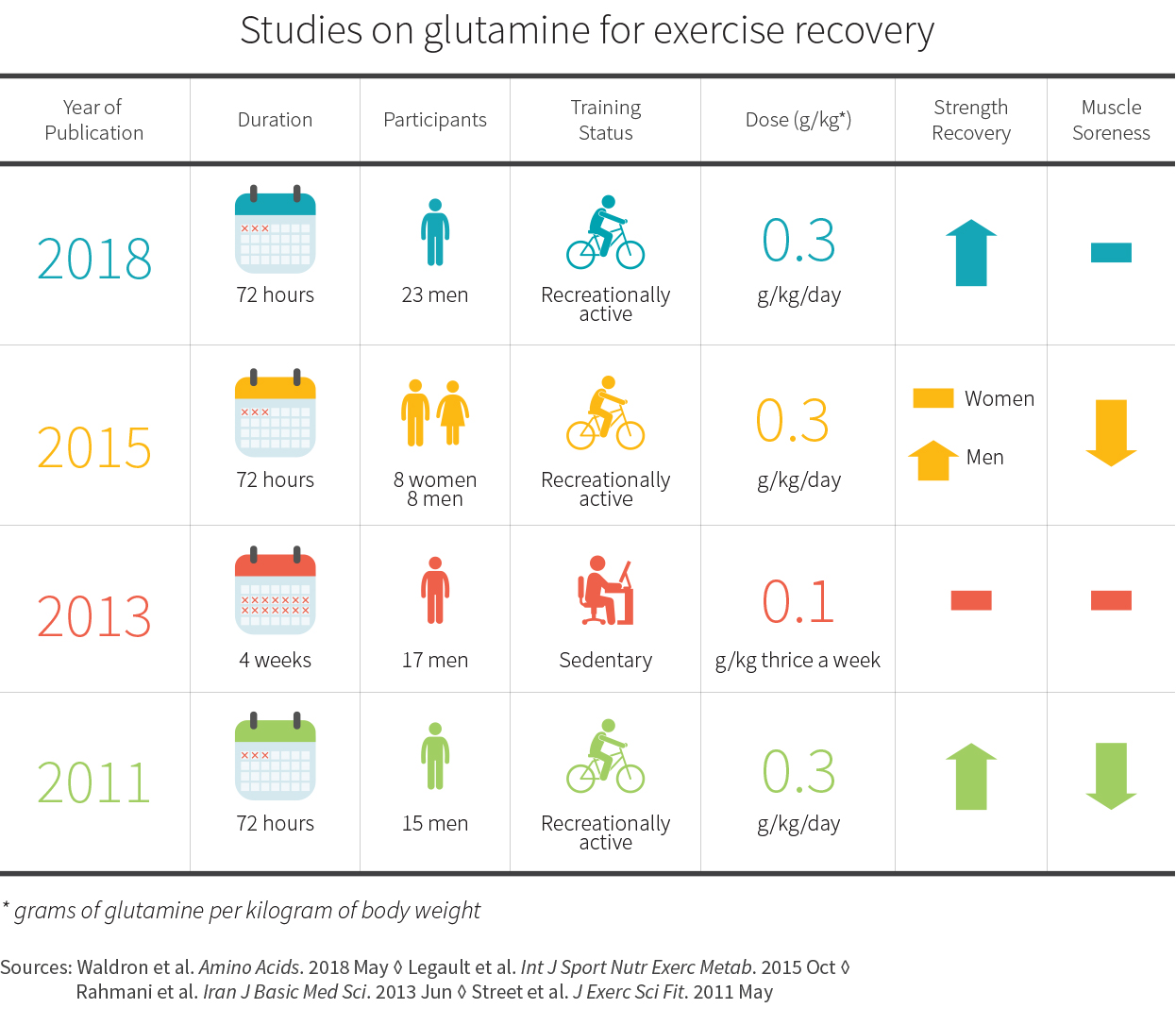Glutamine is one of the 20 amino acids that make up all proteins. It is conditionally essential, meaning it is needed during traumatic conditions like illness, injury, or surgery. It is the most abundant amino acid in blood serum, and it tends to decrease in proportion to the acuteness of trauma to the body.[1][2]
What is glutamine?
Glutamine is one of the 20 amino acids that make up all proteins. It is conditionally essential, meaning it is needed during traumatic conditions like illness, injury, or surgery. It is the most abundant amino acid in blood serum, and it tends to decrease in proportion to the acuteness of trauma to the body.[1][2]
What are glutamine’s main benefits?
The main benefit of glutamine is improved outcomes in trauma, burns, and injuries.[3] It has also been found to affect nitrogen balance (i.e., reduce protein depletion), improve immune function, and reduce infectious morbidity in adults going in for abdominal surgery for peritonitis (an infection of the abdomen).[4] In addition, glutamine may reduce gut permeability (lactulose/mannitol ratio), inflammation (IL-6, TNF-ɑ, C-reactive protein), hospital stay length, and mortality.[1]
In people undergoing radiation therapy for head and neck cancer, glutamine reduced the severity of oral mucositis. This painful condition results from the death of the cells lining the mouth and is often a reason to halt the course of radiation. Post-radiation, glutamine was found to reduce the use of analgesic opioids, nasogastric feeding, and treatment interruptions.[5]
In addition, glutamine may reduce symptom scores of irritable bowel syndrome (IBS) alongside a low-FODMAP diet.[6] Glutamine was found to have no significant effect in the context of Crohn’s disease, though sample sizes were small.[7][8][9][10]
Glutamine is commonly marketed as an exercise supplement, but there are no consistent observed effects on athletic performance from supplementation with glutamine. However, glutamine may increase white blood cell counts and benefit weight reduction.[11]
How does glutamine work?
Glutamine may improve digestion by strengthening the intestinal barrier by reducing intestinal permeability, aiding tight junctions, and promoting enterocyte growth (cells that line the intestines).[3]
Glutamine is the preferred source of fuel for enterocytes as well as lymphocytes, an important cell of the immune system.[6]
Glutamine may act as an anti-inflammatory agent by reducing interleukin 6 (IL-6), tumor necrosis factor-alpha (TNF-ɑ), and C-reactive protein levels. It may also help produce glutathione, the body’s principal antioxidant.[3][1]
What are other names for Glutamine?
Note that Glutamine is also known as:
- L-Glutamine
Glutamine should not be confused with:
- Glutamate
- Alanylglutamine (Sustamine)
Dosage information
Supplementation of L-glutamine tends to be dosed at 5 g or above, with higher doses being advised against due to excessive ammonia in serum. The lowest dose found to increase ammonia in serum has been 0.75 g/kg, or approximately 51 g for a 150 lb individual.
Due to the relative inefficacy of glutamine supplementation for increasing muscle mass, the optimal dosage is not known. The above recommended doses are sufficient for intestinal health reasons and for attenuating a possible relative glutamine deficiency (seen in instances of low protein intake or veganism).
Frequently asked questions
The main benefit of glutamine is improved outcomes in trauma, burns, and injuries.[3] It has also been found to affect nitrogen balance (i.e., reduce protein depletion), improve immune function, and reduce infectious morbidity in adults going in for abdominal surgery for peritonitis (an infection of the abdomen).[4] In addition, glutamine may reduce gut permeability (lactulose/mannitol ratio), inflammation (IL-6, TNF-ɑ, C-reactive protein), hospital stay length, and mortality.[1]
In people undergoing radiation therapy for head and neck cancer, glutamine reduced the severity of oral mucositis. This painful condition results from the death of the cells lining the mouth and is often a reason to halt the course of radiation. Post-radiation, glutamine was found to reduce the use of analgesic opioids, nasogastric feeding, and treatment interruptions.[5]
In addition, glutamine may reduce symptom scores of irritable bowel syndrome (IBS) alongside a low-FODMAP diet.[6] Glutamine was found to have no significant effect in the context of Crohn’s disease, though sample sizes were small.[7][8][9][10]
Glutamine is commonly marketed as an exercise supplement, but there are no consistent observed effects on athletic performance from supplementation with glutamine. However, glutamine may increase white blood cell counts and benefit weight reduction.[11]
Glutamine may improve digestion by strengthening the intestinal barrier by reducing intestinal permeability, aiding tight junctions, and promoting enterocyte growth (cells that line the intestines).[3]
Glutamine is the preferred source of fuel for enterocytes as well as lymphocytes, an important cell of the immune system.[6]
Glutamine may act as an anti-inflammatory agent by reducing interleukin 6 (IL-6), tumor necrosis factor-alpha (TNF-ɑ), and C-reactive protein levels. It may also help produce glutathione, the body’s principal antioxidant.[3][1]
Glutamine supplementation does not affect body composition, but it may accelerate strength recovery from resistance-training sessions and reduce the occurrence of infections in hard-training endurance athletes.
Glutamine is the most abundant amino acid in your body. Your body can synthesize it, so it is not an essential amino acid (EAA), but your requirements may at time outpace your rate of synthesis, making glutamine conditionally essential. Historically, however, glutamine has been considered conditionally essential only in the critically hurt or sick — burn victims and other people in whom physical stress is exceptionally high and catabolism (body-tissue breakdown) rampant.[13]
It is only recently that glutamine studies have started exploring the lesser stress and catabolism caused by strenuous exercise. Some of these studies examined the effect of glutamine on body composition, others on muscle recovery, and yet others on the immune system.
Body composition
The benefits of glutamine in the critically hurt or sick have led some researchers to propose that it might be a useful supplement for athletes engaged in heavy exercise, which is also catabolic in nature.[14] These researchers tested their hypothesis through a double-blind RCT involving 6 resistance-trained men who consumed glutamine or glycine (0.3 grams per kilogram of body weight) one hour before a weightlifting session.[15] Glutamine did not benefit performance.
Another group of researchers tested glutamine (0.9 g/kg) against placebo in 31 resistance-trained men and women during a 6-week resistance-training program.[16] Even such a high daily dose of glutamine did not affect strength or lean-body mass (LBM) more than did placebo (strength and LBM increased in both groups).
Of course, neither study exposed its participants to the high levels of stress experienced by, for instance, burn victims. An RCT involving 18 collegiate male wrestlers aimed to address this issue by comparing placebo with glutamine (0.35 g/kg) during an intensive 12-day cut.[17] Both groups lost 2 kg, with no significant differences between groups with regard to changes in LBM or fat mass.
A 2018 meta-analysis of 5 studies also found no benefit from glutamine on body composition.[11] Although glutamine does play a part in muscle synthesis (it is an independent activator of mTOR[18]), what we obtain through foods seems to suffice; supplementation doesn’t appear to confer additional benefits.
Glutamine supplementation has no effect on lean mass or fat mass, even during aggressive dieting.
Muscle recovery
So glutamine supplementation has no effect on body composition; but might it facilitate recovery from resistance-training sessions?
To help answer that question, researchers gave placebo or glutamine (0.3 g/kg) to 15 recreationally active men right after a muscle-damaging exercise (100 drop-jumps) and for the next four days. They reported that, compared to placebo, glutamine significantly reduced muscle soreness and improved strength recovery.[19]
However, a study of 17 untrained young men reported that taking glutamine (0.1 g/kg) thrice a week for 4 weeks had no effect on muscle soreness, range of motion, or EMG activity up to 48 hours after a muscle-damaging exercise (eccentric leg extensions at 75% of 1-RM).[20] Importantly, this latter study involved untrained men and used a smaller dose, a different dosing schedule, and a different exercise protocol — all factors that could explain the discrepancy between the two studies.
A contraction is isometric when the muscle’s length does not change, and isotonic otherwise. An isotonic contraction is called concentric when the muscle shortens under load (as when you lift a dumbbell) and eccentric when it lengthens under load (as when you control the dumbbell on its way down). Your one-repetition maximum (1-RM) is the heaviest weight you can lift (concentric contraction) for a given exercise.
Most recently, a study of 23 resistance-trained men investigated the effects of taking glutamine with leucine.[21] The men were randomized into three groups and took either leucine (0.087 g/kg), leucine with glutamine (0.087 g/kg + 0.3 g/kg), or a placebo 30 minutes before and after a muscle-damaging exercise (100 drop-jumps), and again before and after recovery tests conducted 24, 48, and 72 hours afterward. Leucine led to better strength recovery at 72 hours only. Leucine with glutamine led to better strength recovery at 24, 48, and 72 hours. Muscle soreness, however, didn’t differ between groups.
Note that these three studies were conducted in men only. Another study recruited 8 men and 8 women, all recreationally active, and gave them placebo or glutamine (0.3 g/kg) one hour before and after a muscle-damaging exercise (80 eccentric contractions at 125% of 1-RM), and again before recovery tests conducted 24, 48, and 72 hours afterward.[22] Strength recovery was modestly improved in men but not in women, although both sexes experienced significant reductions in muscle soreness.

In recreationally active men, glutamine supplementation around exercise appears to improve strength recovery and might reduce muscle soreness. Only one study lasted more than 72 hours, though, which precludes drawing conclusions about the effects of chronic supplementation. Likewise, only one study included women, which precludes drawing conclusions about the effects of supplementation in women.
Illness
Glutamine is a major fuel for cells of the immune system.[23] Plasma glutamine levels are reduced after prolonged endurance exercise, and this reduction correlates with an increased risk of infection.[24]
An early study of endurance athletes (marathoners and ultra-marathoners) reported that taking 5 grams of glutamine right after an athletic event and 2 hours later significantly reduced the occurrence of infections over the following week.[25] Specifically, 19% of the glutamine group reported illness, compared to half of the placebo group.
No other trial has studied the effects of glutamine on infection as an outcome in athletes, but other trials have looked at various aspects of the immune system,[11] such as white-blood-cell function[26][27] and salivary IgA concentrations,[28] and none has found a relationship between an exercise-induced decrease in plasma glutamine levels and changes to the immune system.[29]
Glutamine’s benefits may be mediated by its effects on the intestinal barrier, as more recent evidence has begun to suggest. Prolonged endurance exercise is known to cause leaky gut — a condition in which heat stress and reduced blood flow to the gastrointestinal tract cause intestinal cell damage that loosens tight junctions between cells, allowing for the absorption of things that are not supposed to pass through the intestinal barrier.[30]
In a recent study, glutamine (0.25, 0.5, and 0.9 g/kg) showed a dose-dependent reduction in exercise-induced intestinal permeability.[31] In an earlier study, the reduction in intestinal permeability from glutamine supplementation had correlated with reductions in serum endotoxin and in inflammatory markers.[32]
Glutamine is an important source of energy for intestinal cells and the immune system. Supplementation may reduce exercise-induced dysfunctions of the intestinal tract and might decrease the risk of falling sick from prolonged endurance exercise.
In Summary
There is no evidence that supplemental glutamine helps build muscle or improve body composition.
There is evidence that supplemental glutamine improves strength-training recovery. It may also help maintain the integrity of the gastrointestinal tract during prolonged endurance exercise and thus decrease the risk of getting sick afterward.
So if your goal is to build muscle, don’t waste your money on glutamine. Other supplements are more likely to help, notably creatine, and of course you should ensure you get enough protein.







